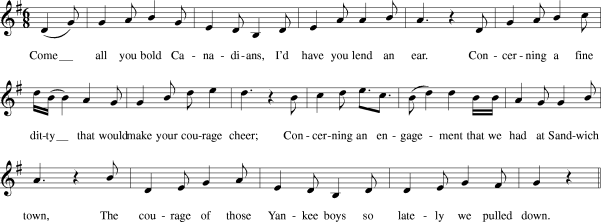On August 16, 1812, the terrified American General William Hull surrendered Fort Detroit along with his 2,500 men. It was a stunning turnaround. Celebrated in song, the victory helped awaken a stronger sense of Canadian identity, one that outlasted the war itself.
Come all you bold Canadians
I'd have you lend an ear
Unto a simple ditty
That will your spirits cheer,
Concerning an engagement
We had at Sandwich town―
The courage of those Yankee boys
So bravely we pulled down.

Erich Rickheit, Digital Tradition Folk Music Database.
During the winter of 1812, territorial governor of Michigan, General William Hull ventured to Washington to take command of the expected American invasion of Canada.
Hoping for a quick and decisive knockout blow, President Madison endorsed Hull’s unconventional bid to invade from the West. By July 1812, Hull and his men had reached Fort Detroit. As his troops crossed into Canada, Hull reassured the residents of his intentions, proclaiming “I come to find enemies not to make them. I come to protect and not to injure you.”
But Hull was fearful of Canada’s Indian allies, and soon began to lose his stomach for the invasion. By August he ordered his forces withdrawn back to Fort Detroit. Some of Hull’s dispirited men began to lose confidence in their general; a few called him a coward.
On August 16, a terrified Hull finally surrendered Fort Detroit, along with his 2,500 men. It was an inspiring victory for the Canadians and a shocking and humiliating defeat for the overconfident Americans.
Purportedly written by Canadian Private Cornelius Flummerfelt as he and the men of the York Militia marched victorious from the Detroit campaign, the lyrics of “The Bold Canadian” celebrate the triumph of Canadian underdogs who, while poorly supplied, nevertheless fought bravely.
Much like “Hunters of Kentucky", “The Bold Canadian” is a congratulatory ballad, and over time its lyrics spawned a deeper sense of Canadian identity, a sturdier attachment to Great Britain, and a defiant resolve by some to keep up the resistance against the no-longer-invincible Yankees to the south.
At the same time, the song helped propagate the myth that it was the militia, rather than Britain’s professional army, that saved Canada from the Americans in 1812.
Last updated: November 20, 2018
